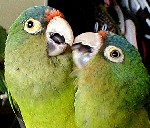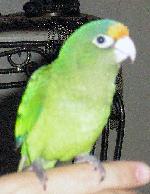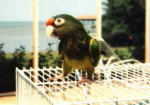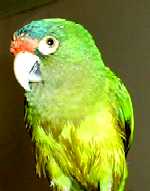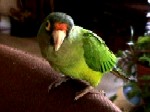Welcome to the
Half-Moon Page!
|
Name: Tavi & Doogie |
Name: Amadeus |
Name: Gumbo |
|
Name: Dinky Dipper
|
Name: Pichi |
|
|
Name:
|
Name: |
Name: Half-Moon Conure (aka: Orange-Fronted Conure) (Aratinga Canicularis)
Description: Generally Green with the throat and upper breast a pale olive. The lower breast and abdomen are a greenish-yellow. Forehead and lores are orange with the front of the crown blue. Outer webs of the flight feathers are blue with the under wing-coverts being a yellowish-green. The underside of the tail feathers are olive-yellow. Periophthalmic Ring is cream-coloured with a pale yellow Iris. The beak is a light horn-color and the feet are grey. Length is 24 cm (9.5 inches). Females generally have a narrower frontal band. Immatures have a narrower frontal band and a darker Iris. All Conures are not sexually dimorphic and must be DNA or surgically sexed.**
In The Wild: They live in open and semi-open regions with trees and bushes, swamps and dry deciduous forest up to 1,500 m (4,500 feet). They prefer river banks and forest edges and have been known to visit cultivated land and plantations. They feed mainly in the morning and are quiet when feeding or endangered. If they are disturbed they fly off screeching loudly. Their call is shrill and repeated rapidly.
Breeding Information: Breeding season usually begins in May. A clutch usually consists of 3 to 5 eggs. The incubation period is an average of 23 days and the fledging period is approximately 50 days. Their eggs measure 22.7 x 19.6 mm (0.89 x 0.77 inches).
Temperament: Medium-noisy bird becoming loud only when excited. They are initially somewhat shy but soon accept their owner. Hardy when acclimatised and accepts other similar-sized species outside of the breeding season. Unlike other Conures they rarely like to bath and are not excessive chewers.**
Diet: This should consist of Pellets, a good Seed Mix (Safflower, Paddy Rice, Oats, Canary Seed and various Millets), various Fruits and Vegetables (particularly carrots and apples), and Greens. White bread and biscuit for rearing. Diets may vary so you should consult your Avian Veterinarian.
** (Please note that not all birds are the same and may vary somewhat in Temperament and Plumage.)
Created by Rio
Designs
Champaign, Illinois
